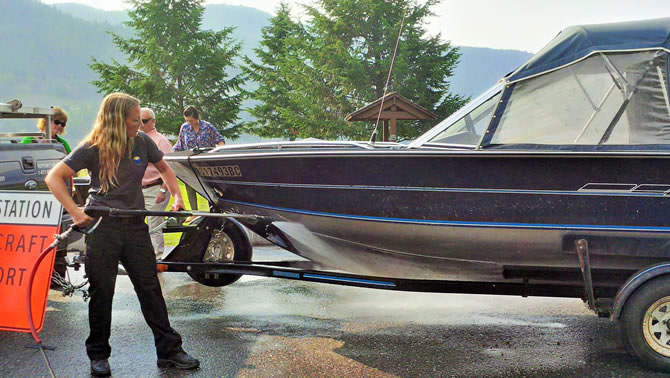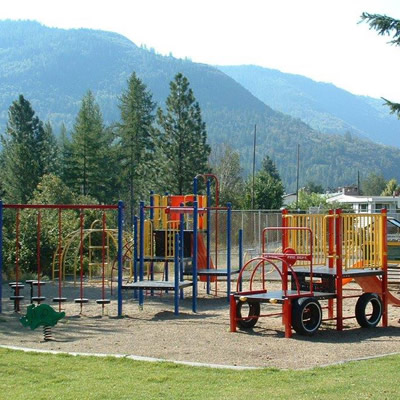Permanent stations to protect B.C. from invasive mussels
Following a successful pilot program last year, the BC Government announced a $2 million boost to the invasive mussel program.

Quagga and Zebra mussels can pose a serious threat to B.C's waterways and sensitive ecosystems in the province. — Photo courtesy BC Government
KELOWNA — Following a successful pilot program last year, today Premier Christy Clark announced a $2 million boost to the province's invasive mussel defence program that will see eight permanent mussel inspection stations installed at major entry points along B.C's borders.
"B.C. is leading the fight against invasive species," said Premier Clark. ͞To date, no zebra or quagga mussels have ever been detected in B.C's waterways and we're going to keep it that way. Eight more inspection stations are yet another tool towards ensuring we remain mussel-free."
Quagga and zebra mussels pose a serious threat to B.C's aquatic ecosystems, salmon populations, hydro power stations and other infrastructure facilities. They can clog pipes, cause ecological and economic damage, displace native aquatic plants and wildlife, degrade the environment and affect drinking water quality.
Thanks to the generous support from BC Hydro, FortisBC, Columbia Power and the Columbia Basin Trust, $2 million in funding will enhance the successful program and introduce more protection at B.C's borders. The Province is also contributing in kind with staff, equipment and office space.
"Invasive mussels are a concern to BC Hydro and we applaud the Province for taking strong measures to protect B.C.'s rivers and lakes," said Mark Poweska, vice president, Generation BC Hydro. "BC Hydro is proud to support this initiative since invasive mussels have a detrimental impact on the environment and can impact our ability to produce power by plugging up pipes and equipment in our dams. In B.C. we rely heavily on the clean, cost-effective power provided by hydroelectric facilities and we are pleased to see the threat from invasive mussels being mitigated."
Five inspection stations will be set up along the B.C.-Alberta border, and three along the B.C.-United States border. These stations will be operational April 1 for the 2016 boating season. In total, 32 conservation officers will work the stations, which will operate 10 hours a day, seven days a week from April through October. This is an increase of 20 crew members from last year's pilot and an additional six mobile decontamination units are being added to the fleet of equipment. The eight inspection stations will have the capability to become mobile if the need arises, travelling to locations throughout B.C. where watercrafts are being detained, waiting for decontamination.
The program will also consist of:
- Increased highway signage at permanent inspection station locations
- Expanded monitoring for quagga and zebra mussels
- Expanded Report All Poachers or Polluters response line coverage
- Increased opportunities to promote "Clean, Drain Dry" education and outreach activities
These enhancements to the province's mussel defence program are a significant step towards protecting our waterways from the threat of quagga and zebra mussels," said Environment Minister Mary Polak. "Through ongoing efforts, partnerships and outreach programs, we are providing the information, tools and necessary border coverage to stop invasive mussels from entering B.C. and creating irreversible damage."
FortisBC views environmental protection as an important part of creating a sustainable future for British Columbians," said Jody Drope, vice president, Human Resources and Environment, Health and Safety, FortisBC. "The collaborators in this program have demonstrated leadership in protecting our freshwater ecosystem. This permanent program will decrease the ongoing threat that invasive mussels pose to the province, including to our hydroelectric dams."
The Invasive Mussel Defence pilot program was launched in 2015. During May-October 2015, over 4,300 boats were inspected, of which 70 were identified as coming from an invasive mussel infested province or state. Out of these 70 watercrafts, 34 required decontamination and 15 were confirmed to be transporting invasive mussels or their larvae. Six were issued a 30-day quarantine order due to risk of live mussels.
"Quagga and zebra mussels pose significant risk to more than just ecosystems, but to agricultural irrigation and more." said Agriculture Minister Norm Letnick. "It is important to keep invasive mussels out of B.C. to reduce the risk of financial hardship for the agricultural industry."
"Protecting aquatic infrastructure and the environment is a priority for Columbia Power and we are pleased to support the creation of permanent mussel inspection stations," said Columbia Power's president and chief executive officer, Frank Wszelaki. "Protecting hydroelectric generating stations from the invasion of harmful quagga and zebra mussels is crucial to maintain the generation of renewable hydroelectricity for the Province of British Columbia."
"While we saw great successes from last year, these enhancements to the program will continue to protect our lakes and rivers for generations to come," stated Forests, Lands and Natural Resource Operations Minister Steve Thomson. "I urge all boaters to be aware of the dangers and practice "Clean, Drain, Dry" to prevent the spread of invasive mussels.
"As with elsewhere in the province, lakes and rivers in the Columbia Basin region are an incredibly important asset, relied upon for everything from power generation to recreation and tourism to community water supply and irrigation," said Neil Muth, Columbia Basin Trust president and chief executive officer. "Keeping these waterways free from invasive mussels is essential and fits with our environmental goal of maintaining and enhancing the health of our aquatic ecosystems."
"The Invasive Species Council of BC has been working with the Province and other partners to educate British Columbians since launching the Clean Drain Dry program, and are pleased to see the expansion of the Invasive Mussels Defence Program," said Dr. Brian Heise, chair of the Invasive Species Council of BC. "We celebrate this announcement and the growing formal partnerships and investment in boat inspections, and look forward to working with people from across B.C. to prevent the spread of these species."
The public is encouraged to report mussel-affected boats/equipment to the B.C. Conservation Officer Service's Report All Poachers and Polluters (RAPP) hotline at 1-877-952-7277.
Find out more about quagga and zebra invasive mussel species and the environmental, economic and social impacts they pose to freshwater: https://news.gov.bc.ca/factsheets/invasive-quagga-mussels-and-zebra-mussels
Find out more about the Clean Drain Dry program, and the Invasive Species Council of BC at: http://bcinvasives.ca/resources/programs/clean-drain-dry
For images of these tiny hitchhikers and their damaging effects: http://bcinvasives.ca/resources/photo-gallery/zebra-and-quagga-mussels





Comments